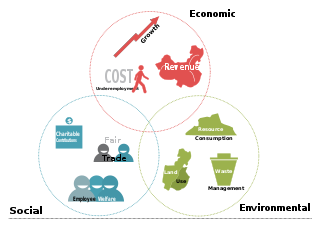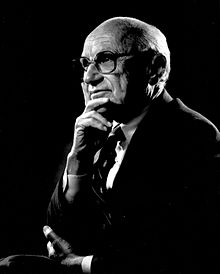Business ethics is a form of applied ethics or professional ethics, that examines ethical principles and moral or ethical problems that can arise in a business environment. It applies to all aspects of business conduct and is relevant to the conduct of individuals and entire organizations. These ethics originate from individuals, organizational statements or the legal system. These norms, values, ethical, and unethical practices are the principles that guide a business.
Corporate governance are mechanisms, processes and relations by which corporations are controlled and operated ("governed").

The triple bottom line is an accounting framework with three parts: social, environmental and economic. Some organizations have adopted the TBL framework to evaluate their performance in a broader perspective to create greater business value. Business writer John Elkington claims to have coined the phrase in 1994.

Corporate social responsibility (CSR) or corporate social impact is a form of international private business self-regulation which aims to contribute to societal goals of a philanthropic, activist, or charitable nature by engaging in, with, or supporting professional service volunteering through pro bono programs, community development, administering monetary grants to non-profit organizations for the public benefit, or to conduct ethically oriented business and investment practices. While once it was possible to describe CSR as an internal organizational policy or a corporate ethic strategy similar to what is now known today as Environmental, Social, Governance (ESG); that time has passed as various companies have pledged to go beyond that or have been mandated or incentivized by governments to have a better impact on the surrounding community. In addition, national and international standards, laws, and business models have been developed to facilitate and incentivize this phenomenon. Various organizations have used their authority to push it beyond individual or industry-wide initiatives. In contrast, it has been considered a form of corporate self-regulation for some time, over the last decade or so it has moved considerably from voluntary decisions at the level of individual organizations to mandatory schemes at regional, national, and international levels. Moreover, scholars and firms are using the term "creating shared value", an extension of corporate social responsibility, to explain ways of doing business in a socially responsible way while making profits.
In a corporation, a stakeholder is a member of "groups without whose support the organization would cease to exist", as defined in the first usage of the word in a 1963 internal memorandum at the Stanford Research Institute. The theory was later developed and championed by R. Edward Freeman in the 1980s. Since then it has gained wide acceptance in business practice and in theorizing relating to strategic management, corporate governance, business purpose and corporate social responsibility (CSR). The definition of corporate responsibilities through a classification of stakeholders to consider has been criticized as creating a false dichotomy between the "shareholder model" and the "stakeholder model", or a false analogy of the obligations towards shareholders and other interested parties.
Shareholder value is a business term, sometimes phrased as shareholder value maximization. It became prominent during the 1980s and 1990s along with the management principle value-based management or "managing for value".

Technostructure is the group of technicians, analysts within an organisation with considerable influence and control on its economy. The term was coined by the economist John Kenneth Galbraith in The New Industrial State (1967). It usually refers to managerial capitalism where the managers and other company leading administrators, scientists, or lawyers retain more power and influence than the shareholders in the decisional and directional process.

The stakeholder theory is a theory of organizational management and business ethics that accounts for multiple constituencies impacted by business entities like employees, suppliers, local communities, creditors, and others. It addresses morals and values in managing an organization, such as those related to corporate social responsibility, market economy, and social contract theory.
Corporate responsibility is a term which has come to characterize a family of professional disciplines intended to help a corporation stay competitive by maintaining accountability to its four main stakeholder groups: customers, employees, shareholders, and communities.
Dodge v. Ford Motor Co., 204 Mich 459; 170 NW 668 (1919), is a case in which the Michigan Supreme Court held that Henry Ford had to operate the Ford Motor Company in the interests of its shareholders, rather than in a manner for the benefit of his employees or customers. It is often taught as affirming the principle of "shareholder primacy" in corporate America, although that teaching has received some criticism. At the same time, the case affirmed the business judgment rule, leaving Ford an extremely wide latitude about how to run the company.
Michael Cole Jensen was an American economist who worked in the field of financial economics. From 1967-1988, he was on the University of Rochester's faculty. Between 2000 and 2009 he worked for the Monitor Company Group, a strategy-consulting firm which became "Monitor Deloitte" in 2013. Until 2000, he held the position of Jesse Isidor Straus Professor of Business Administration at Harvard University.

In economics, the profit motive is the motivation of firms that operate so as to maximize their profits. Mainstream microeconomic theory posits that the ultimate goal of a business is "to make money" - not in the sense of increasing the firm's stock of means of payment, but in the sense of "increasing net worth". Stated differently, the reason for a business's existence is to turn a profit. The profit motive is a key tenet of rational choice theory, or the theory that economic agents tend to pursue what is in their own best interests. In accordance with this doctrine, businesses seek to benefit themselves and/or their shareholders by maximizing profits.
The Business Roundtable (BRT) is a nonprofit lobbyist association based in Washington, D.C. whose members are chief executive officers of major United States companies. Unlike the U.S. Chamber of Commerce, whose members are entire businesses, BRT members are exclusively CEOs. The BRT lobbies for public policy that is favorable to business interests, such as lowering corporate taxes in the United States and internationally, as well as international trade policy, like NAFTA.
Robert Edward Freeman is an American philosopher and professor of business administration at the Darden School of the University of Virginia, particularly known for his work on stakeholder theory (1984) and on business ethics.
A corporate social entrepreneur (CSE) is someone who attempts to advance a social agenda in addition to a formal job role as part of a corporation. It is possible for CSEs to work in organizational contexts that are favourable to corporate social responsibility (CSR). CSEs focus on developing both social capital and economic capital, and their formal job role may not always align with corporate social responsibility. A person in a non-executive or managerial position can still be considered a CSE.
Shareholder primacy is a theory in corporate governance holding that shareholder interests should be assigned first priority relative to all other corporate stakeholders. A shareholder primacy approach often gives shareholders power to intercede directly and frequently in corporate decision-making, through such means as unilateral shareholder power to amend corporate charters, shareholder referendums on business decisions and regular corporate board election contests. The shareholder primacy norm was first used by courts to resolve disputes among majority and minority shareholders, and, over time, this use of the shareholder primacy norm evolved into the modern doctrine of minority shareholder oppression.
Conscious business enterprises are those which choose to follow a multiple stakeholder approach, as opposed to 'traditional business' strategy, which focuses primarily on shareholders and profit maximation. In contrast, conscious businesses can be double-bottom line, triple-bottom line, or more, by focusing on other stakeholders such as employees, customers, measurable positive societal impact, the community, or the environment.

In business, and only in United States corporate law, a benefit corporation is a type of for-profit corporate entity whose goals include making a positive impact on society. Laws concerning conventional corporations typically do not define the "best interest of the corporation", which has led some to believe that increasing shareholder value is the only overarching or compelling interest of a corporation. Benefit corporations explicitly specify that profit is not their only goal. Their activities may or may not differ much from traditional corporations. An ordinary corporation may change to a benefit corporation merely by stating in its approved corporate bylaws that it is a benefit corporation.
Progressive capitalism is an approach to capitalism that seeks to improve the current neoliberal American capitalism that emerged in 1980. Progressive capitalism aims to improve economic results through four defining beliefs, namely the vital role businesses play in the economy by creating jobs, fostering innovation, enabling voluntary exchange, and providing competitive goods and services; the recognition of the important role public goods, public institutions, public services and public infrastructure play in supporting businesses including: research, schools, health care, social insurance, taxation, labor law and regulation of markets; the need for the state to be involved in design and oversight of the playing field; and the integration of social justice, stewardship of natural resources and responsibility to all major stakeholders. It is being advocated by Ro Khanna and Joseph Stiglitz.
Business purpose refers to the wider, long-term goals of a commercial enterprise. It expresses the corporate's reason for existing, its particular commitment with respect to the surrounding world. A business purpose statement serves as an affirmative reminder of the company's core identity to employees, customers, and other stakeholders; a common ground hopefully enabling them to focus on their particular tasks while feeling what they do is part of a wider, socially valued endeavor. Alongside established normative, purpose is a fundamental component of business ethics and is closely related to corporate statements such as vision, mission, and values. A simplifying, although debatable view, contends that business purpose may exist in one of two forms: current purpose, or mission; and future purpose, or vision. The term has gained wide media attention in recent times.






